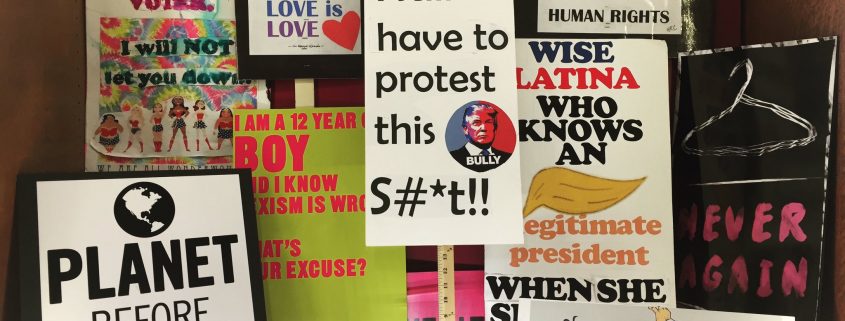Doheny Library exhibits Women’s March signs
“Future Voter I will NOT let you down,” “Everyone is created equal” and “Planet before Profit” read some of the posters from the Women’s March on display at Doheny Library.
Sue Luftschein, librarian and head of special collections and archival and metadata librarian, and Michaela Ullmann, exile studies librarian at the USC special collections library, initiated the process of collecting these posters from protesters in an effort to make an exhibit earlier this year. The exhibit went on display at the end of April and will continue for about another month, according to Luftschein.
“I realized that sometimes we are missing certain collections, having certain gaps in our collections … This was the biggest march in Southern California and in Los Angeles’s history,” Ullmann said. “I thought it would be great to reach out and see if we could collect some of these posters to add [to] our collection.”
Both Ullmann and Luftschein said that the exhibit is an opportunity for students to see the collection without having to request materials.
Lindsay Anderson, a senior majoring in history, helped develop the exhibit.
“I was a little nervous, but then I thought that this would be a good opportunity to learn something that I have never learned before,” Anderson said. “I didn’t go to the Women’s March and I felt like this was a redeeming opportunity.”
Anderson said that Luftschein and Ullmann helped her create the exhibit and in doing so, gave her ideas for the exhibit arrangement. She said the other librarians gave their views on which posters to display as well.
“There were about 126 to 127 posters and I had to narrow it down to 10,” Anderson said.
Anderson added that the most challenging part was choosing from a wide array of posters on different topics such as immigration, women’s rights and environmental rights.
“I wanted to choose posters that had messages that were easy to understand and I also wanted it to be diverse in terms of choosing which posters to use,” she said.
Rayna Koishikawa, a recent graduate, who majored in narrative studies said the Women’s March and this exhibit shows the amount of support that people have for each other.
“It felt like everyone in the street that day was supporting each other,” Koishikawa said. “It’s just remembering that day and reminding people of how much support they have.”
Ullman said that in future years, these posters will be an artifact to preserve history. In addition, Ullman said that people who submitted the posters included personal stories behind the posters and signs.
“For people who don’t have the opportunity to attend any of these marches, it’s an opportunity to see rather than just looking at it on your phone or your TV,” Luftschein said. “To see the actual objects, the things that people created, and how meaningful they were to the people who created and carried them.”

